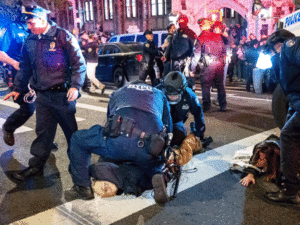A written motion filed by the government last week asked the 8th Circuit Court of Appeals to reject the amicus curiae briefs because they present “no new arguments” that had not been covered in the appeal filed by Sholom Mordechai’s attorneys.
The move stunned legal experts. ACLU’s Wilson said he never encountered a case where the government refused to agree to the filing of an amicus curiae from the ACLU. Other experts consulted by this writer say they can find no precedent for the Department of Justice opposing a friend-of-the-court brief from any respected legal organization.
“Assuming for the sake of argument that the briefs present nothing new, they surely can’t do any harm in that case. So why go to these unusual lengths to resist them?” asked the ACLU director.
He noted that something more serious is obviously at play. “This is an effort to keep at bay issues that might discredit the government. They are trying to put the genie back in the bottle. But we’re hoping to do just the opposite–we know there is more to discover and we need to bring that information out.”
Advocacy Groups Tear Aside Veneer Of Legality
Joining the ACLU, two prominent legal and advocacy groups, WLF (Washington Legal Foundation) and NACDL (National Association of Criminal Defense Lawyers) threw their support behind the appeal.
The WLF tore apart the veneer of legality masking Judge Reade’s legal opinions, sacked her sentencing calculations, and accused her of violating the Federal Sentencing Guidelines. Representing 18 prominent law professors, former federal judges and former prosecutors, the WLF urged that the case be remanded to a different judge for re-sentencing.
The ACLU highlighted Judge Reade’s active participation with prosecutors before the raid on Agriprocessors, which included e-mails in which Reade asked for a “final game plan” for the raid and a “briefing” on the operation. The brief accused her of violating the Constitution by acting as an arm of the prosecution.
The organizations called on the 8th Circuit Court of Appeals to vacate Sholom Mordechai’s conviction and grant him a new trial. “Due process demands it. The Constitution demands it,” the ACLU insisted.
The NACDL brief was uncompromising and scathing in its criticism, condemning what it called ethical misconduct by Judge Reade and federal prosecutors. The brief said that the ICE documents support the claim that Chief Judge was prejudiced in favor of the Government and thus must disqualify herself.
“She should not have discussed strategies and the ongoing investigation and other issues with prosecutors,” the NACDL brief said, noting that Reade violated the Constitution repeatedly by attending the meetings at which these discussions were held.
Judge Reade’s Charade
The brief said that Reade compounded this wrongful conduct by concealing it from the defense. Even worse, when confronted by disclosures of her behavior in the ICE documents in Sholom Mordechai’s new-trial motion, Reade sweepingly dismissed the allegations as untrue.
She was obligated by law to turn the case over to an impartial judge as requested, but refused to do so. Instead, she accorded her own denials of wrongdoing the status of “facts” even though they contradicted assertions in the ICE documents.
She thus became the key “factual witness” in the case and used her own testimony about what she did or didn’t do to arrive at a ruling in favor of herself.
The NACDL brief harshly criticized this charade. It called attention to Reade’s clear violation of ethical and legal guidelines in her repeated denials of wrongdoing and in insisting her behavior was above reproach.
The NACDL brief so thoroughly demolished Judge Reade’s credibility that it triggered a desperate attempt by the Attorney’s Office to neutralize its impact by impugning the organization’s integrity.
Gov’t Effort To Quell Support For Rubashkin
In its motion to quell support for Sholom Mordechai, the government took aim at both NACDL and defense lawyers by insinuating that NACDL consulted with the defense team and made use of their help in writing the amicus curiae brief.
“Counsel for defendant appears to have had some involvement in the preparation of at least one of the briefs,” the prosecutors complained. In the case of the NACDL brief, the appellate counsel appeared “to have done some editing and made some small suggestions,” leaving the government no option but to object to the brief, the motion said.
Since there is nothing improper about defense counsel reviewing and making suggestions for an amicus brief, the prosecutors realized they were on shaky ground here. Reduced to an almost pathetic last-resort defense, they argue that if NACDL’s arguments had sufficient merit they would have been advanced by “the defendant’s cadre of attorneys.”
Since they were not included in the defendant’s appeal, it’s obvious that they are “devoid of merit” and are nothing but a waste of everyone’s time.
In other words, since the “cadre of attorneys” working for Sholom Mordechai are such powerhouses, they doubtlessly thought of every possible angle. Any argument not included in the appeal is therefore worthless.
How flattering to the appellate team that the government regards them as brilliant and infallible. But how contradictory and comical to propose trashing an amicus brief for possessing the key credentials that the government earlier insisted such a brief must present–a new argument!
As all parties await the decision from the 8th Circuit Court of Appeals to accept or deny the amicus curiae briefs, the government’s effort to put the genie back in the bottle is having the opposite effect.
“Rubashkin was fighting a very lonely battle. But the case has shifted and is now receiving increasing attention and support,” one of his attorneys said. “Prominent legal advocacy groups see this as a test case with broad implications for many other defendants in similar situations. There are countless people in this country who like Sholom Rubashkin have fallen victim to judicial or prosecutorial conduct, an antiquated sentencing system and an increasingly over-criminalized society.”







